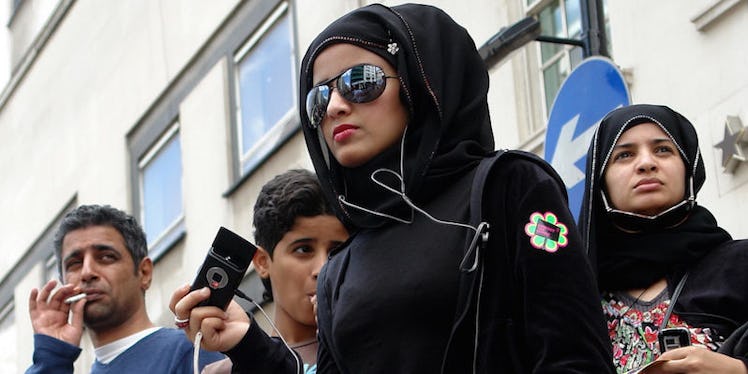“Do not talk about Islam, please.”
After two missed calls, my mom resorted to this message at 10:23 pm. From her home in Mississippi, she had just heard about the Chapel Hill shootings, which happened eight miles down the road from my dorm at Duke.
My body, still aching from the Duke adhan reversal just a couple of weeks earlier, was forced, again, to confront the question I had already asked numerous times in my life: Will America ever have room for my Muslim/Arab identity?
But, it is not the noxious culture of Islamophobia and ignorance that was the sole source of my aching.
Instead, it was the instinctive reaction I received from my mom that wrought my pain: “Do not talk about Islam, please.”
When my mom urged me to stay silent about my religion, I understood it as a means to reduce myself; to mute the most core aspect of my identity. I cannot be whole if I can’t be my whole.
But, I can’t blame my mom. She lives more 12 hours away, and the notion of an unsafe America is fact, not theory for her.
So, she says to keep religion within. Allow it to manifest in actions, but not in speech.
I have been away from home for nearly six years now, including four years at Duke. I have learned how to minimize the physicality of my religious affiliation, and at times, I have been ashamed of doing so.
But, I cannot minimize the effects my faith has had on how I choose to carry myself.
For me, Islam, intellectually understood, is an inextinguishable light. Islam introduced me to humility, service and unconditional love for humanity.
It unwaveringly inspires me to do good things in this world, even when this world hates. It fuels my hope for a more tolerant, informed future and it keeps me patient.
Islam’s divine call to action has informed many Muslim lives.
In a festering Islamophobic culture, where discrimination and crimes run rampant, Muslims have proactively spilled goodness onto others.
We see this with the three victims of the tragic murder in Chapel Hill, NC.
Before #OurThreeWinners were murdered execution-style in Chapel Hill, the victims dedicated much of their lives to the service of others.
They volunteered for the homeless, packed free meals and raised money to deliver free dental supplies.
But, that’s just a recent example. There are thousands of other stories of Muslims spreading good in the face of hate that go unheard.
The Islamic Society for North America (ISNA) and Jamaica Muslim Center in New York co-sponsor a “Stop Hunger Now” service project that packages more than 30,000 meals a year for vulnerable children and families around the world.
Similarly, Muslim students at Duke work at Project Downtown to provide meals and support for homeless individuals in Durham, NC and at Urban Ministries, to help stock a food pantry.
Fortunately, it’s not just Muslims; I truly believe kindness lives in most American Millennials, of all backgrounds.
It’s especially encouraging to see young Americans show empathy for foreign Muslim populations that face unthinkable conflict and poverty, even when the suffering is thousands of miles away.
Such compassion is reflected through this year’s meeting of Clinton Global Initiative University (CGIU), where more than 1,000 students from around the world gather in Miami to address pressing challenges, like how young people can contribute to peace-building efforts in the Middle East.
The thoughtful projects launched over the years by CGIU participants inspire me, including efforts to build specialized facilities for the disabled in a Jordanian refugee camp and deliver medical supplies to Syria.
But, when supporting Muslim communities globally, let’s also think locally.
Millennials have done incredible things to help Muslims in conflict-afflicted countries across the world, and now, in light of contemporary events, we are also called to confront the challenges that Muslims face in our own backyards.
I am working to do that through my CGIU commitment to develop Conflict Cookbook, which features both the stories and favorite recipes of Muslim women from conflict countries, who now face misconceptions about their faith in America.
Mostly non-Muslim students, who have dedicated their time and resources to helping me break down stereotypes and bring down walls, support this venture.
But, it will take more than my cookbook to eradicate Islamophobia in America.
It will take more students, like George Washington University’s Mariam Adil, who, through a CGIU Commitment, is working to develop a video game that challenges biases, including anti-Muslim sentiment.
It will take young people, like the several student groups coming to CGIU to launch cross-faith and cross-cultural conversations on campuses, ranging from the University of Alabama-Birmingham to Cornell.
It is up to all Millennials to take on Islamophobia in America to ensure that ALL communities can thrive and engage in safe spaces. Millennials are at the forefront of the parallel education movement happening outside of the classrooms.
Because of our digital nativity and high levels of optimism, we are better equipped than previous generations to foster a more informed and tolerant America.
It is not up to only Muslims to tackle Islamophobia. If we are to guard against the marginalization and dehumanization of communities, it is up to all of us to combat ignorance with education.
It starts with social media campaigns that highlight the injustices of under-represented communities.
It starts with student projects that bring in diverse people working on a common goal.
It starts with a Facebook post that showcases your solidarity with marginalized populations.
It starts with college campuses that foster discussions to break down misconceptions.
It starts with us confronting the prejudices we hold, before they confront individuals, before they precipitate in a human interaction.
It starts with initiating conversations.
It starts with the generation that will soon become the new leadership of America.
